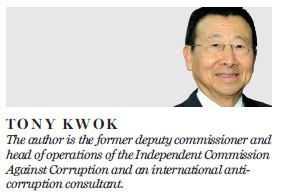Stop abusing judicial review
Updated: 2015-12-10 09:10
By Tony Kwok(HK Edition)
|
|||||||||
Tony Kwok writes that he supports Henry Litton's concerns over the increasing abuse of judicial review in HK - which wastes money and delays important projects
The increasing abuse of judicial review (JR) is wasting billions of dollars of taxpayers' money and causing more serious delays to important public works and housing projects. It is often used by political parties, especially the "pan-democrats", to obstruct and discredit the government. The situation cries out for strong action against the gross misuse of JR. Hence it is most gratifying to hear a distinguished retired judge of the Court of Final Appeal (CFA), Henry Litton, making a scathing attack on the rising misuse of JR.
In the 1970s when I was doing law enforcement duties, Henry Litton was already a legendary figure in the legal circles and a top advocate in Hong Kong. He earned my greatest respect for giving up his lucrative private practice to join the bench, where he subsequently became a founding member of the CFA. His opinions are therefore most authoritative. But in today's circumstances, when outspoken "pan-democratic" lawyers dominate the legal profession and media, he is also very courageous to stick his neck out to criticize the abuse of JR, knowing full well he faces strong censure from such unrestrained obstructionists. I commend Henry Litton for his moral courage and integrity.
Abuse of the JR process now runs to over 160 cases a year. Most are dismissed at various stages for lack of merit, but by that stage tremendous damage has already been done.
I would like to distinguish between two types of JR. One covers those launched by organizations or individuals of their own volition. They will be responsible for legal fees and possibly hefty court costs. If there is any abuse in the process, it will be bad but not the worst kind of abuse. The other, far worse type, is those cases instigated by "pan-democratic" parties which use a low-income citizen as a front to apply for legal aid, entitling it to be financed from the public purse, and with absolutely no adverse consequences for the litigant and his/her supporters - even if eventually the case is dismissed.
The JR on the Hong Kong-Zhuhai-Macao Bridge is an outrageous example of gross abuse, with an elderly recipient of social welfare used as a front by the Civic Party to launch the action. The representing counsel is said to be aligned with the same political party, charging the Legal Aid Department (LAD) hefty fees for his service. The problem is well summed up by Henry Litton in his speech: "The judge of first instance has got it all wrong, he had made a mistake. By then, it was far too late to address the consequences of the mistake." The government thereby suffered a loss of at least HK$8.8 billion and a delay of one year in the project.
In support of Henry Litton's informed and authoritative views, I believe an urgent and thorough review of the process should be undertaken. I also offer the following suggestions:
1) The LAD should tighten the threshold for granting legal aid for JR. The proper test should be that set by the CFA in 2007, that it should be "a reasonable arguable case with a realistic prospect of success". I would like to know who the LAD's authority for approving JR suits is. Is it purely an internal decision of the LAD? As such cases can have huge financial implications, shouldn't the decision be reviewed by an expert panel chaired by a retired top judge?
2) Low-income litigants acting as a front should be barred. This can be ensured by means of a thorough interview of the applicant. The LAD should also require the litigant to bear a certain percentage of the legal fees to discourage flippant legal action.
3) Currently, a litigant getting legal aid can request the appointment of a special counsel to take up his/her case, thereby incurring very high legal fees. The LAD should take measures to prevent any connivance between counsel and litigant for private gain. One simple way is to set a rigid standard fee for legal aid in all JR cases.
4) One of Henry Litton's criticisms concern what he describes as the incompetence of some judges sitting on the Court of First Instance (CFI) whose rulings were overturned by the CFA - but by which time serious harm had already been done. With over 160 JR cases a year, the judiciary should set up a special JR court and appoint a competent judge familiar with the JR principles to deal with all cases. There is a precedent for such an arrangement going back to when the Human Rights Bill was introduced.
5) The judiciary should set up a fast track for all JR cases so they can be dealt with expeditiously from the CFI to the CFA, which would minimize costly delays involving major public works projects.
The Legislative Council should urgently initiate a full hearing into this pressing problem and pass a motion to push the LAD and the judiciary to consider the above recommendations.

(HK Edition 12/10/2015 page10)